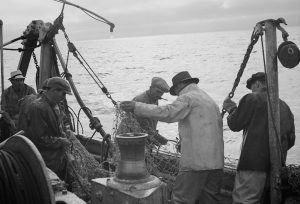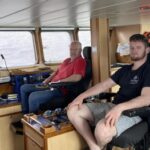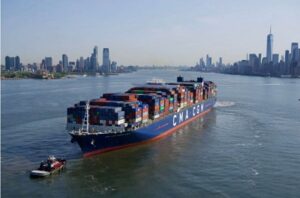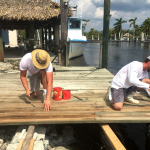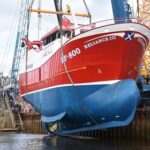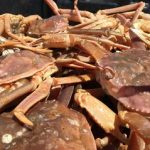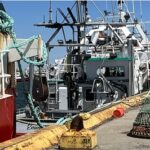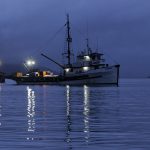Tag Archives: canneries
Bellingham’s shoreline history: A boom, bust of resource extraction
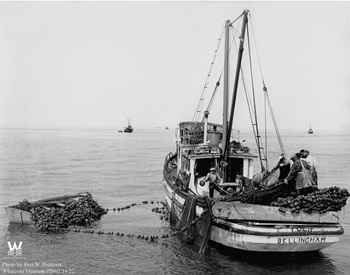 By 1890, the U.S. Census estimated approximately 18,500 people lived in Whatcom County. In the years that followed, additional lumber mills popped up. These included the Puget Sound Mill at the mouth of Padden Creek, the E.K. Wood Mill at Boulevard Park, and the Whatcom Falls Company (Loggie Mill) off Whatcom Creek. Pacific American Fisheries (PAF) first appeared in 1899 to process local salmon, eventually establishing the largest canning operation in the world. Both industries attracted large numbers of Asian immigrant workers, leading later to a significant shift in culture — along with significant racist worker backlash — in the region. The rich salmon runs also attracted canners and fishermen from Croatia, Finland and Ireland. Photos, >>click to read<< 09:20
By 1890, the U.S. Census estimated approximately 18,500 people lived in Whatcom County. In the years that followed, additional lumber mills popped up. These included the Puget Sound Mill at the mouth of Padden Creek, the E.K. Wood Mill at Boulevard Park, and the Whatcom Falls Company (Loggie Mill) off Whatcom Creek. Pacific American Fisheries (PAF) first appeared in 1899 to process local salmon, eventually establishing the largest canning operation in the world. Both industries attracted large numbers of Asian immigrant workers, leading later to a significant shift in culture — along with significant racist worker backlash — in the region. The rich salmon runs also attracted canners and fishermen from Croatia, Finland and Ireland. Photos, >>click to read<< 09:20
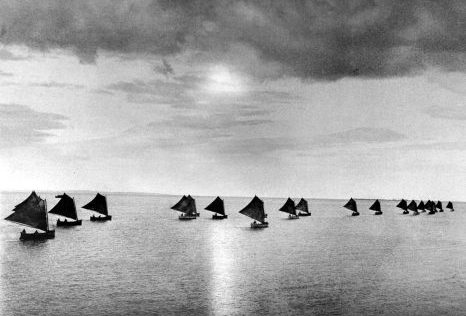
When sailboats ruled Bristol Bay
One hundred and thirty-two years ago, the Bristol Bay commercial fishery began on the shores of the Nushagak River when the first cannery went into operation and canned a little more than 4,000 salmon. Within four years, three more canneries appeared on the Nushagak, and within a decade canneries were built on the Naknek and Kvichak rivers. The dawn of the 20th century saw dozens of canneries around Bristol Bay catching, processing and canning millions of pounds of sockeye salmon every summer. By 1910, Bristol Bay accounted for 40 percent of Alaska’s commercially caught salmon. Even today, Bristol Bay makes up about 40 percent of Alaska’s salmon value. Canneries are large industrial operations. In the early days, coal and steam provided the power to run complex systems of boilers, belt-driven pulleys and winches needed to butcher, cook, can and deliver salmon to the world. But when it came to actually catching fish in Bristol Bay, canneries relied upon the muscle of men and the power of wind. click here for images, and read the story 11:27
US Tuna Treaty survives, new deal for 2017 – Tunaboat Association comments on fishing pact
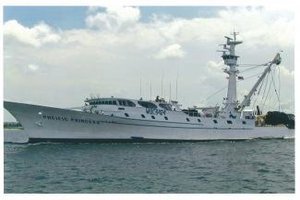 The US Tuna Treaty has survived after 18 negotiation meetings over the last seven years, with the latest one just concluded in Auckland, New Zealand. The multilateral Treaty is important for American Samoa because it allows US puirse seiners that supply our two canneries to fish in the exclusive economic zones of island countries that are close by. Read the rest here Tunaboat Association comments on fishing pact – The President of the American Tunaboat Association, Brian Hallman, says the fishing agreement reached over the weekend in Zealand between the United States and Pacific Island countries is from the point of view of the US fleet, the best outcome they could have achieved under difficult circumstances. Read the rest here Tri Marine looks to build coalition – Tri Marine International, which operates the Samoa Tuna Processors cannery in Atuu, says it has been anticipating a change in how the US purse seiners would manage access to the tuna fishing grounds in the Western and Central Pacific for several years. Chief Operating Officer of Tri Marine, Joe Hamby, says now that the future of the US South Pacific Tuna Treaty has been resolved, “we will be able to focus on building a coalition of fishing companies and resource owners committed to supporting American Samoa as a regional tuna processing hub.” Read the rest here 19:55
The US Tuna Treaty has survived after 18 negotiation meetings over the last seven years, with the latest one just concluded in Auckland, New Zealand. The multilateral Treaty is important for American Samoa because it allows US puirse seiners that supply our two canneries to fish in the exclusive economic zones of island countries that are close by. Read the rest here Tunaboat Association comments on fishing pact – The President of the American Tunaboat Association, Brian Hallman, says the fishing agreement reached over the weekend in Zealand between the United States and Pacific Island countries is from the point of view of the US fleet, the best outcome they could have achieved under difficult circumstances. Read the rest here Tri Marine looks to build coalition – Tri Marine International, which operates the Samoa Tuna Processors cannery in Atuu, says it has been anticipating a change in how the US purse seiners would manage access to the tuna fishing grounds in the Western and Central Pacific for several years. Chief Operating Officer of Tri Marine, Joe Hamby, says now that the future of the US South Pacific Tuna Treaty has been resolved, “we will be able to focus on building a coalition of fishing companies and resource owners committed to supporting American Samoa as a regional tuna processing hub.” Read the rest here 19:55
Tri Marine disappointed with NMFS decision – Purse seiners will continue to fish but…
 The decision by the National Marine Fisheries Service not to issue an emergency rule to exempt purse seiners that deliver at least half of their catch to the local canneries from the ban on fishing in the high seas, puts fish supply for the canneries in jeopardy. In early statements Tri Marine said that locally based purse seiners would have to fish in waters close to Papua New Guinea and would find it uneconomical to travel all the way to Pago Pago to off load. Read the rest here, Meanwhile, The president of the American Tunaboat Association Brian Hallman says the ban on high seas fishing is very costly to US purse seiners, and while they will continue to fight on, at some point boat owners cannot continue to lose money and stay in business. Read the rest here 17:29
The decision by the National Marine Fisheries Service not to issue an emergency rule to exempt purse seiners that deliver at least half of their catch to the local canneries from the ban on fishing in the high seas, puts fish supply for the canneries in jeopardy. In early statements Tri Marine said that locally based purse seiners would have to fish in waters close to Papua New Guinea and would find it uneconomical to travel all the way to Pago Pago to off load. Read the rest here, Meanwhile, The president of the American Tunaboat Association Brian Hallman says the ban on high seas fishing is very costly to US purse seiners, and while they will continue to fight on, at some point boat owners cannot continue to lose money and stay in business. Read the rest here 17:29

































